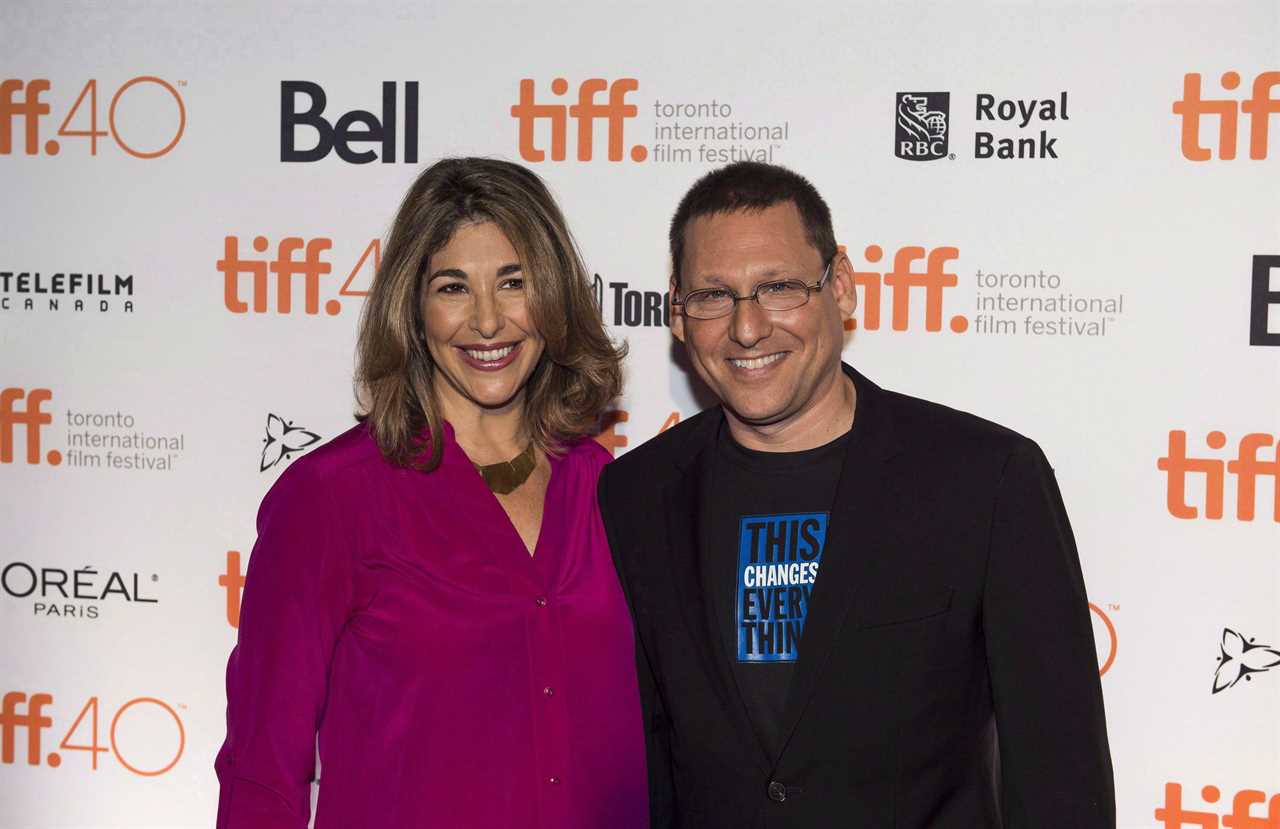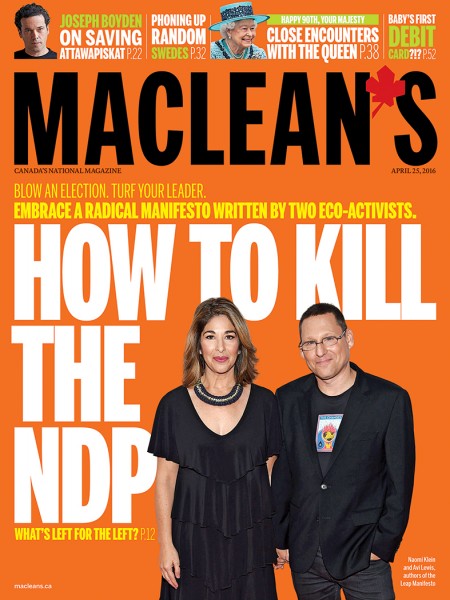
Something there is about the pundit’s life that doesn’t mind a fight, so when I heard that Avi Lewis (kids: ask your parents!) will be running for the NDP in the next federal election, I called Anne McGrath.
I suppose I could have called Avi Lewis, but (a) Campbell Clark over at the Globe already did that and (b) as expected, Avi Lewis thinks Avi Lewis’s entry into electoral politics is a great idea. What Anne McGrath thinks about it, I could only guess. So I had to ask.
McGrath is the national director of the NDP and is, to some extent, the living repository of the party’s memory of what it felt like to be on a roll. She was, with Brad Lavigne and Jamey Heath and Brian Topp and a few others, part of the small group who worked with Jack Layton through that first, terribly disappointing election of 2004, and then the barely less disappointing election of 2006, and the only slightly more encouraging election of 2008. Finally McGrath and Layton and most of the others basked in what everybody else called the amazing overnight success of the 2011 “Orange Wave” election, which saw the federal party win an unprecedented—and, to say the least, since unmatched—103 seats.
But I wanted to ask her about Lewis because of what came next: McGrath played a key role in Rachel Notley’s 2015 Alberta provincial NDP victory. Also unprecedented, also since unmatched. McGrath was still Notley’s deputy chief of staff in 2016, when the federal NDP gathered in Edmonton for a national convention.
Two big things happened at that convention. One, the national leader, Tom Mulcair, faced a leadership review vote from party members, and damned if he didn’t lose it outright. Two, a bunch of left activists, many not particularly affiliated with the NDP, showed up to discuss their vision of a future Canada, the so-called Leap Manifesto. The manifesto had been unveiled by its proponents during the 2015 election. Mulcair had greeted it the way your vegan cousin might greet a gift of lamb shanks, except the analogy doesn’t really work because there’s no way Mulcair was the vegan in this scenario. After the NDP lost seats and votes in that election, the Leapers were ready to try again at the 2016 campaign.
The Leap manifesto’s proponents call it, in a website that still operates six years later, “A Call for a Canada Based on Caring For the Earth and One Another.” You’re right: Sounds like socialism. When delegates to the Edmonton convention voted to debate the manifesto, at the riding level, over the next two years, Maclean’s took it well. Here was our next cover:

I tell you, it never stops being a fun place to work. The “two eco-activists” in the photo are author Naomi Klein and her husband, Avi Lewis. She wrote some noteworthy books, including the global bestseller No Logo. His dad is a former leader of the Ontario NDP. Surely this was some kind of coup.
Lewis patiently explained that he intended no coup. (“I wasn’t really engaged in the leadership question, and like everyone else, I was stunned by the result.”) And then again a few months later. Was he interested in being a candidate? “Not in the slightest.”
The central schism in Edmonton was between Notley’s provincial NDP, who were trying to sell oil to pay for the rest of their agenda, and the Leapers, who wrote that there was “no longer an excuse for building new infrastructure projects that lock us into increased extraction decades into the future.” That meant no new pipelines.
Cranky exchanges ensued. Notley called the Leapers naive, ill-considered and tone-deaf. Fully two years later, Lewis tweeted that Notley’s government was “relentlessly hostile” to Leap because it had been “completely captured by the oil industry.”
So what of Anne McGrath, who’s working full-time on a national campaign whose candidate in West Vancouver—Sunshine Coast—Sea to Sky is half of that half-decade-old slanging match?
Are you comfortable speaking on the record, I asked? “Sure,” she said. A refreshingly old-fashioned answer. There really were sharp divisions over Leap, she said. “The NDP [provincial] government was working really hard to get a better price for resources. I think acknowledging that a transition [i.e. a long-term global transition away from fossil fuels] has to happen, but also that as long as there were still oil and gas resources, that they should at least be paid a fair price. And we were hampered by the lack of market access.”
So what’s with the Lewis candidacy? “I would say that there is a lot more that unites us—I mean, it’s a truism, but it’s because it’s true—there is a lot more that unites us than divides us,” McGrath said. “But people have different approaches to how to deal with natural resources. And I believe there has to be a way of dealing with transition that doesn’t leave all those energy workers behind, and that is real. And that actually talks about how we transition to more renewables, more clean tech, all those kinds of things. And I’ve had conversations with Avi about that and he’s very much in agreement with that.”
I sensed that McGrath was making some effort to put ideas into words that had not yet been neatly tucked into talking points. “It sounds like there’s still a tension there,” I said. “At least a conceptual tension.”
“Yeah,” she said readily. “Mm-hmm. Mm-hmm.” Again, refreshingly old-fashioned. And a bit disorienting. I mean, I work in Justin Trudeau’s Ottawa. I’m not used to hearing people acknowledge conflict.
“One of the things I’ve been thinking about a lot, actually, over the last few years is how we reconcile some of the differences we have,” McGrath said. “It has always been the case—I’ve talked to Rachel about this as well—that there are some regional differences in the country.” She mentioned the constitutional debates of the 1990s, and uranium in Saskatchewan: How can you be anti-nuclear in a place with uranium mines? Sometimes, the NDP found, you can’t.
One way to handle a potentially problematic candidate, I suggested, is to let him run in a riding the NDP has never won. Of course McGrath wasn’t buying that. “He is very rooted in that community. That’s the riding he wanted to run in. And looking at his activism over the last few years, you can see how significant place is in his politics. He’s very committed to that riding and I think he’s committed over the long haul.”
The other thing that’s happened, and it’s important to acknowledge this, is that the centre of gravity on some of these debates has shifted markedly. The line in Leap that set Notley off was this idea that there should be no new natural-resource infrastructure. Well, Notley’s government, and then Jason Kenney’s, have continued to work hard to ignore that edict, and pipeline after pipeline keeps running into almost surreal levels of practical difficulty. And on Tuesday, the head of the International Energy Agency made headlines worldwide by calling for an immediate end to new oil and gas projects if the world is to have any hope of meeting net-zero emissions targets for 2050.
Re-reading Leap, in fact, one finds very little that today’s Trudeau Liberal cabinet ministers would even blink at, if instructed to send out excerpt after excerpt on their Twitter and Instagram accounts.
I mean: “We want a universal program to build energy efficient homes, and retrofit existing housing, ensuring that the lowest income communities and neighbourhoods will benefit first… High-speed rail powered by renewables and affordable public transit can unite every community in this country.” Insert flag emojis randomly and the tweets practically write themselves.
Finding Leap a bit de trop is no longer a realistic option for the NDP: this is a moment where electoral and ideological, or at least idealistic, imperatives converge. The NDP has lost seats against Trudeau’s Liberals two elections in a row, first because he ran to Mulcair’s left and then because he was able to persuade Jagmeet Singh’s target voters that they couldn’t risk handing power to the Conservatives by accident. He will certainly repeat that pitch next time. Twitter legions warning of a CPC-NDP-media complex to wreck Canada’s one hope of escaping the abyss, the Liberals, will do the same.
The NDP’s rebuttal will be that Trudeau is at best a shaky steward of his purported values. Lewis and Leap co-author Martin Lukacs have been rehearsing this rebuttal for years, not least in Lukacs’ sharp and underrated book The Trudeau Formula. This corner offers no prediction of their success or the NDP’s. It’s not even easy any more to find video of the cable-TV debate show Lewis used to host. Probably few Canadians under 60 have a clear idea who he even is. But the impulse to reach out to him, rather than letting old divisions fester, is probably healthy.
The post Avi Lewis: You mean this isn’t how to kill the NDP? appeared first on Macleans.ca.
-------------------------------
By: Paul Wells
Title: Avi Lewis: You mean this isn’t how to kill the NDP?
Sourced From: www.macleans.ca/politics/ottawa/avi-lewis-you-mean-this-isnt-how-to-kill-the-ndp/
Published Date: Wed, 19 May 2021 14:47:17 +0000
Read More
Did you miss our previous article...
https://badpoliticians.com/world-politics/covid19-global-south-responses-have-revealed-social-policy-challenges-and-strengths
 UK PoliticsWorld PoliticsVideosPrivacy PolicyTerms And Conditions
UK PoliticsWorld PoliticsVideosPrivacy PolicyTerms And Conditions
